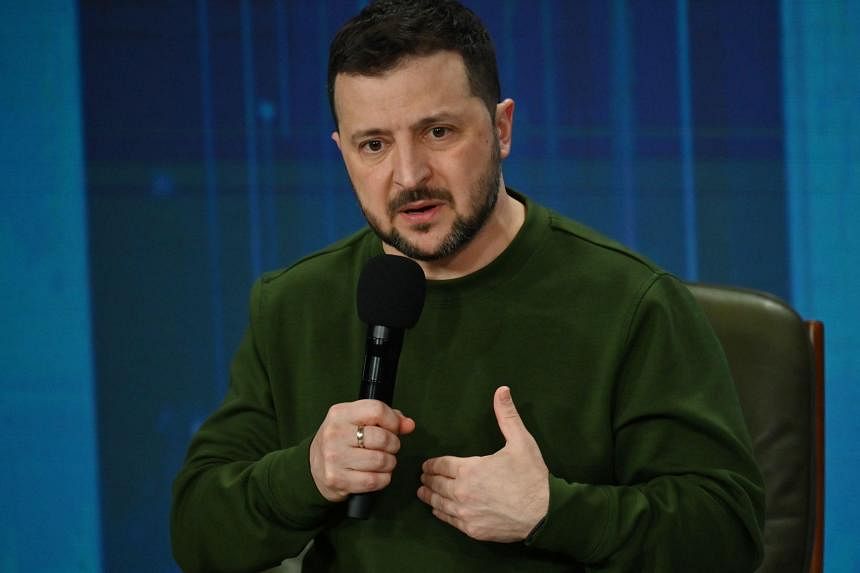KYIV – The Ukrainian authorities are worried that President Volodymyr Zelensky is vulnerable to a Russian disinformation campaign that will seek to undermine his authority.
Kyiv is bracing itself for a Kremlin-sponsored narrative that will seek to exploit doubts about the President’s standing in an effort to destabilise public trust, particularly among Ukrainian front-line troops, according to a person familiar with Mr Zelensky’s thinking who spoke on condition of anonymity.
The issue comes at a delicate moment for the Ukrainian leader, whose once-unassailable popularity is slipping as the war enters a third year and Russian troops mount an offensive.
Officials in the country are concerned that the advances could gain momentum by the summer if allies do not scale up deliveries of ammunition, with stocks running low.
Central to the Kremlin’s effort will be a bid to erode Mr Zelensky’s democratic legitimacy in the eyes of the public as his five-year term comes to a close without a vote to seek re-election.
The Ukrainian leader has made clear that he anticipates the Kremlin to latch on to the issue, even as President Vladimir Putin in March stages an election whose outcome is tightly controlled by the Russian authorities to extend his nearly quarter-century rule.
“It’s not an opinion held by Western partners or perhaps somebody inside Ukraine – but a narrative and programme of the Russian Federation,” Mr Zelensky said earlier this week.
He said intelligence from Group of Seven (G-7) nations had obtained documents verifying a Kremlin plan.
With about a fifth of Ukrainian territory under Russian occupation, millions of people having fled the country and the nation’s infrastructure battered by the two-year invasion, martial law has imposed restrictions on elections.
Mr Zelensky, who took office on May 20, 2019, would otherwise be campaigning for a vote held at the end of March if he were to seek a second term.
Picking away at a democratic deficit in Ukraine would seem to be a hard sell from the Kremlin.
Mr Putin repeatedly insisted that he would not amend the Constitution to extend his tenure, only to pull an about-face in 2020 as the world grappled with the Covid-19 pandemic, opening a path to stay in power until 2036.
The Organisation for Security and Cooperation in Europe has criticised the conduct of Russian elections, and was not invited to observe March’s vote.
Protests and dissent are heavily restricted. The burial on March 1 of Russian opposition leader Alexei Navalny, who died in prison in February, was accompanied by heavy police presence aimed at deterring protests against Mr Putin.
Nevertheless, Ukrainian counter-intelligence has described a Russian plan to unleash a campaign to undermine public trust in democratic institutions in the first half of June, including claims that Mr Zelensky has overstayed his tenure from May.
The campaign will aim to undermine the authorities’ legitimacy after May 20 as well as “spread panic, despair, lead to an artificial conflict between civil and military authorities, a spat between us and our allies” and promote conspiracy theories, it said.
Mr Zelensky raised the issue with a group of lawmakers in a closed-door meeting in February, urging them to ensure that the legitimacy line is not spread, according to somebody who was in the meeting, who spoke on condition of anonymity.
One factor in Mr Zelensky’s sense of vulnerability is fading popularity.
Although the wartime president is backed by a large majority of Ukrainian citizens, polls show his standing softening.
February’s dismissal of his popular top general Valeriy Zaluzhnyi and setbacks on the front line have prompted a slow erosion of trust.
Republicans call for vote
Other surveys in February showed that Ukrainians who believe the nation is moving in the wrong direction outnumbered those who hold the opposite view, for the first time since the invasion began.
And while a majority maintains that Ukraine should dispense with elections in war, the number of those who think Mr Zelensky should not seek a second term climbed 9 percentage points since December to 43 per cent, according to a February survey from the Kyiv International Institute of Sociology.
Ukrainian allies have backed Kyiv’s view that the country must focus on the war effort, a position that Mr Zelensky said could be affirmed during a visit expected soon by French President Emmanuel Macron.
But the issue has been raised in some corners.
A number of US Republican Congress members, who are holding up a US$60 billion (S$80.7 billion) aid package for Ukraine in the House, have called for an election to underscore democracy.
Ukraine’s legislation prohibits elections during wartime, as long as martial law has been enacted.
But the legal wording opens some room for uncertainty because it also specifies that a head of state’s term is for five years. The president is limited to two terms. BLOOMBERG

